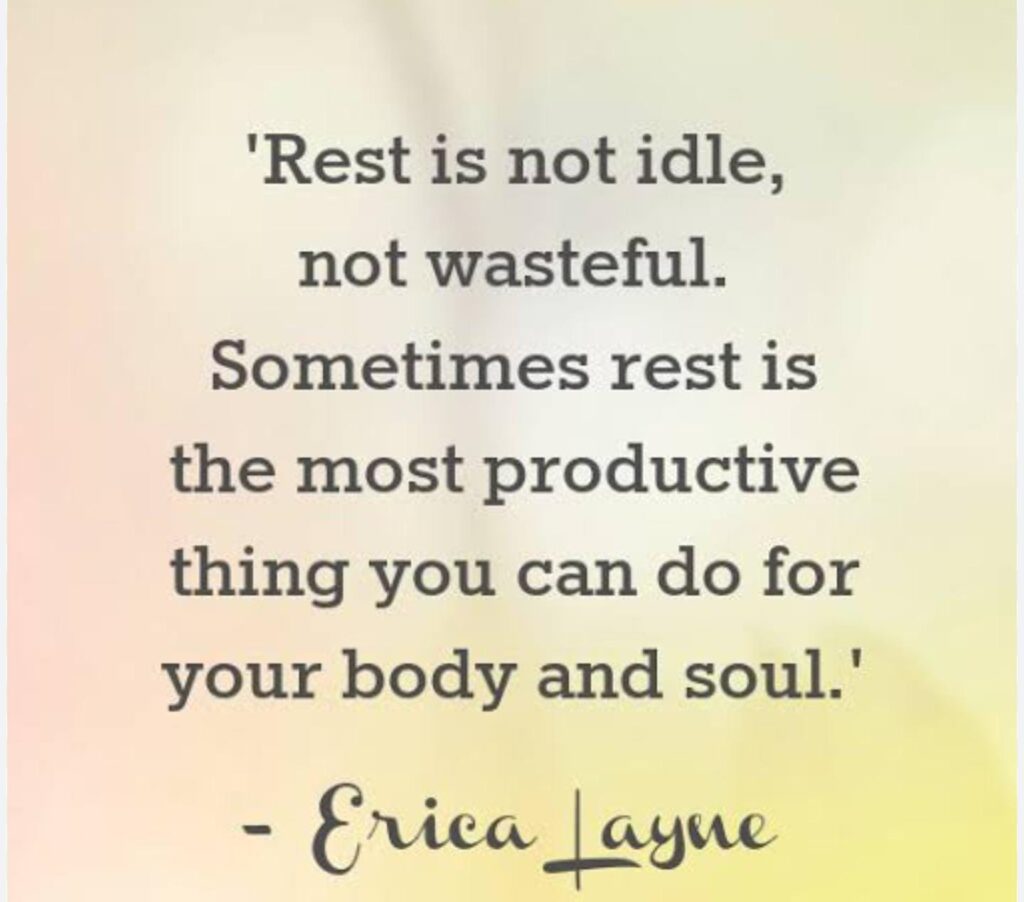21st Oct, 2023
“If a plant only gets sunlight, it’s very harmful.
It needs darkness too,
In the darkness, it converts oxygen into carbon dioxide. We are like that too. We need periods of doing & periods of non-doing.” ~Robert Pirsig
According to the Dictionary, “To Rest is to cease work or movement in order to relax, sleep, or recover strength.”
Even though it seems counterintuitive, time spent resting actually makes you more productive. Alex -Kim Pang, a Silicon Valley consultant & researcher, describes the balance between work and rest in his book, ‘Rest: Why You Get More Done When You Work Less.’
He says: “Rest is not this optional leftover activity. Work and rest are actually partners. They are like different parts of a wave. You can’t have the high without the low. The better you are at resting, the better you will be at working.”
Researchers once studied the relationship between doing nothing and creativity.
They used a positron emission tomography (PET) scan to conduct the first neuroimaging study of brain activity when in a “resting state.”
In essence, they wanted to know: what is the brain doing when you are doing nothing?
They found activations in multiple regions of the association cortex, the researchers write, “We were not seeing a passive silent brain during the ‘resting state,’ but rather a brain that was actively connecting thoughts and experiences.”
Essentially, the researchers demonstrated that the brain during the rest period defaults to creativity.
When you are doing absolutely nothing, the brain engages in what the researchers termed “random episodic silent thought” or REST.
And during REST, the brain’s association cortice —those areas in the brain that are known to gather information from the senses and from elsewhere in the brain and link it all together, in potentially novel ways are firing.
Or, put simply, during REST, the brain “uses its most human & complex parts.”
The key takeaway was that Doing nothing actually promotes creativity.
Neil Gaiman, the famous English writer, says when he wants to write, he gives himself two options:
- a) You don’t have to write.
- b) You can’t do anything else.
Gaiman further explains: “I go down to my lovely little gazebo at the bottom of the garden, sit down, and I’m absolutely allowed not to do anything. I’m allowed to sit at my desk, I’m allowed to stare out at the world, I’m allowed to do anything I like, as long as it isn’t anything.
I’m not allowed to do a crossword, read a book, phone a friend, all I’m allowed to do is absolutely nothing, or write.
But writing is actually more interesting than doing nothing after a while. You’ve been staring out the window now for about 5 minutes, and it kind of loses its charm. And you’re going, ‘Well, might as well write something.’ That was always—and still is my biggest rule.
Understanding that rest isn’t just about sleep means that you can’t pile it all on at the end of the day. You can prevent yourself from being truly drained by incorporating opportunities for ‘rest’ into your work day.
Letting your mind rest is the key to better productivity & creativity.
Don’t wait until you feel depleted to start filling your tank. Plan short breaks throughout the day and look ahead to see when you might want to take a few days off. Allow a buffer between activities and meetings so you don’t get overwhelmed.
Making sure you get enough rest requires a shift in mindset. When you embrace the idea that being busy doesn’t necessarily mean being productive, you can build rest into your day without guilt. Even a few minutes of rest can help you be more productive, creative & satisfied with your day.
This weekend, REST & stay blessed forever.

